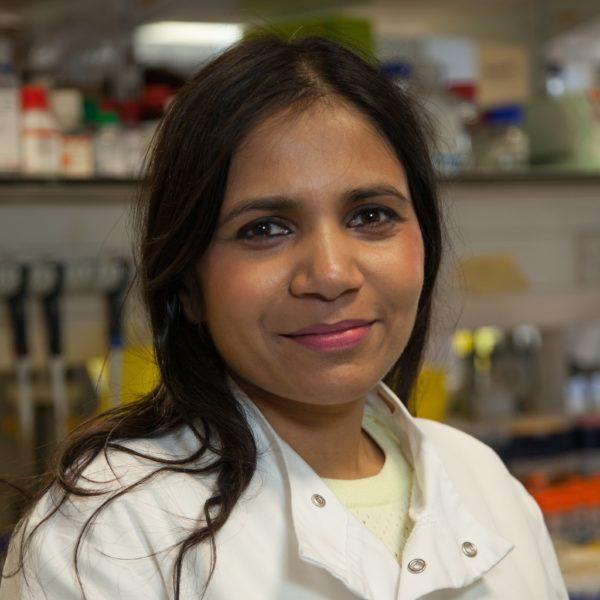
Dr Bela Wrench
MBBS, MD (Res), MRCP, FRCPath
Clinical Senior Lecturer
Senior Bennett Fellow
Group Leader
née Patel
Research Focus
We are interested in understanding the cellular and molecular mechanisms responsible for relapses in acute lymphoblastic leukaemia and progressing these insights into translational diagnostics and clinical trials.
Key Publications
Author name on publications, Bela Patel
Adipocytes disrupt the translational programme of acute lymphoblastic leukaemia to favour tumour survival and persistence. Nature Communications (2021) 12(1):5507. PMID: 34535653
Priming Death Receptor Mediated Apoptosis with Arginine Starvation Sensitises Arginine Auxotrophic B-ALL to CAR-T. Blood (2021) 138 (Supplement 1): 2787. doi.org/10.1182/blood-2021-151734
Molecular Classification Improves Risk Assessment in Adult BCR-ABL1-negative B-ALL. Blood (2021) 138(11): 948-958. PMID: 33895809
Mouse xenograft modelling of Human Adult Acute Lymphoblastic Leukaemia provides mechanistic insights into adult LIC biology. Blood (2014) 124(1):96-105. PMID: 24825861
Major Funding
- 2022-2025 - Barts Charity, NGS based Minimal Disease Monitoring in Adult ALL, £219,556
- 2022-2025 - Polaris Grant, ADI-PEG20 tumour pre-sensitisation as a new paradigm in immune-oncology, £115,000
- 2019-2022 - Cancer Research UK (CRUK), Clinical Research Training Fellowship, Investigating ADI-PEG20 metabolic therapy to target improved anti-cancer immune responses and outcomes from chimeric antigen receptor T-cell therapy (CART)
- 2016-2023 - CRUK Programme Award, Personalising therapy for adults with Acute Lymphoblastic Leukaemia, £1,678,115.55 (£208,076 to BW)
- 2017-2023 - CRUK New Agents Committee, Targeting arginine deprivation in adult acute lymphoblastic leukaemia (ALL), £50,000
- 2015-2022 - Blood Cancer UK Bennett Senior Fellowship, Unravelling mechanisms of tumour dormancy in adult ALL, £1.2M
Other Activities
- Clinical Lead for the National Adult ALL Minimal Residual Disease Laboratory
- Member of the National Cancer Institute ALL subgroup
- Cancer Pathway Board Member For Acute Leukaemia
Themes/Keywords
Research
Our overarching aim is to understand the forces driving minimal residual disease (MRD) resistance and relapse in acute lymphoblastic leukaemia (ALL) and to develop effective interventions that could eliminate or prevent these processes. We apply dynamic models of the tumour microenvironment and functional screening of a widely characterised panel of patient xenotransplantation models as well as direct molecular (bulk and single cell RNA/DNA sequencing) and cellular assessment of clinical samples to define, characterise and target vulnerabilities in resistant leukaemia cell fractions.
My laboratory interests are complimented by my clinical expertise in adult ALL (Honorary Consultant, Dept of Haemato-Oncology, St Bartholomew’s Hospital). I am clinical lead of the National Adult ALL Minimal Residual Laboratory and a member of the National Cancer Research Institute adult ALL subgroup.
Other Activities
- Clinical Lead for the National Adult ALL Minimal Residual Disease Laboratory
- Member of the National Cancer Institute ALL subgroup
- Cancer Pathway Board Member For Acute Leukaemia
Major Funding
- 2022-2025 - Barts Charity, NGS based Minimal Disease Monitoring in Adult ALL, £219,556
- 2022-2025 - Polaris Grant, ADI-PEG20 tumour pre-sensitisation as a new paradigm in immune-oncology, £115,000
- 2019-2022 - Cancer Research UK (CRUK), Clinical Research Training Fellowship, Investigating ADI-PEG20 metabolic therapy to target improved anti-cancer immune responses and outcomes from chimeric antigen receptor T-cell therapy (CART)
- 2016-2023 - CRUK Programme Award, Personalising therapy for adults with Acute Lymphoblastic Leukaemia, £1,678,115.55 (£208,076 to BW)
- 2017-2023 - CRUK New Agents Committee, Targeting arginine deprivation in adult acute lymphoblastic leukaemia (ALL), £50,000
- 2015-2022 - Blood Cancer UK Bennett Senior Fellowship, Unravelling mechanisms of tumour dormancy in adult ALL, £1.2M
Recent Publications
SET-PP2A complex as a new therapeutic target in KMT2A (MLL) rearranged AML Di Mambro A, Arroyo-Berdugo Y, Fioretti T et al. Oncogene (2023) 42(10) 3670-3683
Genetic and genomic analysis of acute lymphoblastic leukaemia in older adults reveals a distinct profile of abnormalities: analysis of 210 patients from the UKALL14 and UKALL60+ clinical trials Creasey T, Barretta E, Ryan SL et al. Haematologica 107(10) 2051-2063
Adipocytes disrupt the translational programme of acute lymphoblastic leukaemia to favour tumour survival and persistence Heydt Q, Xintaropoulou C, Clear A et al. Nature Communications (2021) (1)
Clinical Outcome of Coronavirus Disease 2019 in Haemato-oncology Patients. Aries JA, Davies JK, Auer RL et al. British Journal of Haematology (2020) (1)
https://www.ncbi.nlm.nih.gov/pubmed/32420609
Genomic analyses identify recurrent MEF2D fusions in acute lymphoblastic leukemia WRENCH BR Nature Communications (2017) 7(1)
Pegylated-asparaginase during induction therapy for adult acute lymphoblastic leukaemia: toxicity data from the UKALL14 trial WRENCH BR leukaemia (2017) (1)
High Frequency and Poor Outcome of Ph-like Acute Lymphoblastic Leukemia in Adults Roberts KG, Payne-Turner D, McCastlain K et al. Blood (2015) 126(10) 2618
The Role of Neutrophils in Measles Virus–mediated Oncolysis Differs Between B-cell Malignancies and Is Not Always Enhanced by GCSF Dey A, Zhang Y, Castleton AZ et al. Molecular Therapy (2016) 24(10) 184-192
Mouse xenograft modeling of human adult acute lymphoblastic leukemia provides mechanistic insights into adult LIC biology Patel B, Dey A, Castleton AZ et al. Blood (2014) 124(10) 96-105
Human mesenchymal stromal cells deliver systemic oncolytic measles virus to treat acute lymphoblastic leukemia in the presence of humoral immunity Castleton A, Dey A, Beaton B et al. Blood (2014) 123(10) 1327-1335
For additional publications, please click hereTeam
Clinical Research Fellows
-
Dr Michael Austin
PhD Students
- Shruti Patel
- Ronas Kesmez (MBPhD)
Adult ALL MRD laboratory
- Shaun Bevan
- Helen Warwicker
Biography
I undertook my medical studies at Imperial College of Science Technology and Medicine.
After general post-graduate medical training I decided to sub-specialise in Haematology, inspired by the opportunity to link laboratory diagnostics with clinical care in a meaningful way.
In 2005 I joined Professor Letizia Foroni’s Laboratory at University College London to undertake MD research into adult ALL and MRD resistance. Subsequently, in 2008, I was awarded an intermediate Clinician Scientist Fellowship (Bloodwise) where I investigated mechanisms regulating adult leukaemia initiating cell activity. I was awarded the Blood Cancer UK Bennett Senior fellowship in 2015 to start my research group at the Barts Cancer Institute.
